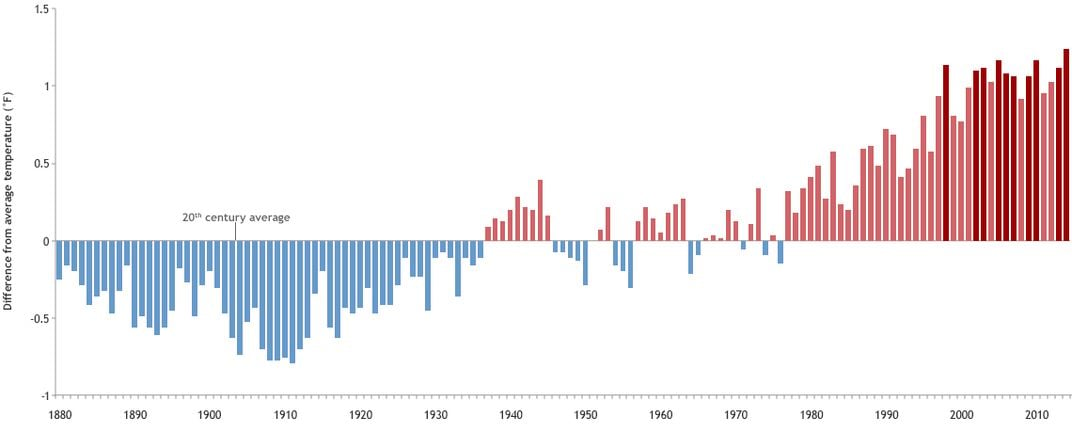For the 4th Time Since 1997, We All Just Lived Through the Hottest Year Ever Recorded
2014 beats out previous record holders even without El Niño’s warming powers
/https://tf-cmsv2-smithsonianmag-media.s3.amazonaws.com/filer/b5/8d/b58d3731-ea74-48eb-b560-6dd35f8c54a9/42-24107848.jpg)
Back in September, the National Oceanic and Atmospheric Administration predicted that 2014 could end up as the hottest year since records began in 1880. Well, they were right. Both NOAA and NASA have officially declared it so.
Don’t be blasé about this. Graphing the issue, as NOAA’s Climate.gov does here with data from the National Climatic Data Center, does not look good.

Americans might be confused by this news — given the "polar vortex" that that produced frigid temperatures last winter and even cooled the summer. (Also, it could be linked to melting Arctic sea ice caused by climate change.) But that kink in the jet stream merely shifted warm air someplace else. Alaska and the Arctic bore the brunt of it. The result: Alaska, Arizona, California and Nevada all set temperature records, explains The New York Times.
NOAA’s global view helps illustrate this record year. An animation of 2014 surface temperatures around the world, as compared to the average from 1981-2010, shows uncomfortable blotches of warmth. It also makes clear how isolated the cool temperatures in North America really were.
Let's try some other ways of putting this news into perspective. Overall, the temperature was 1.24 degrees Fahrenheit above the 20th century’s average. The twenty warmest years on record were the past twenty years. Ten of the warmest years on record have happened since 1997.
And we’ve lived through four record breaking years — 2014, 2010, 2005 and 1998 — in that same period. In case you forget, the Met Office, the U.K.’s national weather service, reminds us that humans are probably to blame. "Our research shows current global average temperatures are highly unlikely in a world without human influence on the climate," says Peter Stott, the agency’s head of climate attribution.
It’s true that 1998 was given a boost by a strong El Niño — something that the Times reports climate-change skeptics use to bolster their ideas. But, that logic is erroneous:
With the continued heating of the atmosphere and the surface of the ocean, 1998 is now being surpassed every four or five years, with 2014 being the first time that has happened in a year featuring no real El Niño pattern. Gavin A. Schmidt, head of NASA’s Goddard Institute for Space Studies in Manhattan, said the next time a strong El Niño occurs, it is likely to blow away all temperature records.
“Obviously, a single year, even if it is a record, cannot tell us much about climate trends,” Stefan Rahmstorf, head of earth system analysis at the Potsdam Institute for Climate Impact Research in Germany, told the Times. “However, the fact that the warmest years on record are 2014, 2010 and 2005 clearly indicates that global warming has not ‘stopped in 1998,’ as some like to falsely claim.”
Other analyses, such as the University of Alabama in Huntsville’s, based on recordings in the lower atmosphere, don’t award 2014 the title. But as The Washington Post points out, NASA and NOAA’s assessment will likely be cited frequently. It may be just one year, but 2014 stands as a symbol for the larger trend… at least until the next warmest year on record takes its spot.

